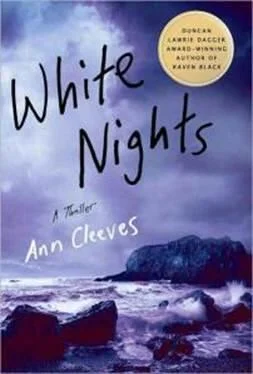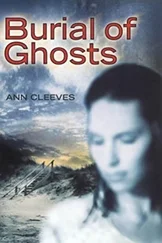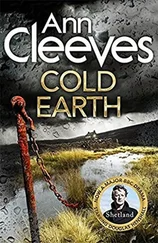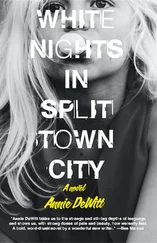‘You stay here. I’ll get you something.’ Before Sandy could object he was halfway across the road. He could hear the Whalsay man shouting after him. ‘A Mars Bar then. And crisps. Salt and vinegar. And a can of Coke. Not the bloody Diet shite.’
The shop had been built on to the last house in the terrace and was hardly bigger than an English suburban garage. There were shelves all round the walls for self-service and a refrigerated counter with a lump of Orkney cheddar and a couple of pounds of vacuum-packed streaky bacon. In one corner, the post office: a rack of official forms and some scales for weighing parcels. A young man stood behind the food counter. Perez recognized Martin Williamson, the chef who’d prepared the food for the exhibition the night before. Williamson’s father had run a hotel in Scalloway until he’d drunk all the profits and the family had sold up and moved into Lerwick. The father had died soon after. He’d fallen into the water at the ferry terminal, full of drink. Rumour had it that he’d jumped, but nobody had seen him fall, so how could they know?
Yet Martin had a reputation for good humour. Even at the old man’s funeral, he’d been heard cracking a joke with one of his friends. There were people who’d disapproved of that; others thought he was putting on a brave face. The story would be linked to him for ever. It defined him: Martin Williamson, the man who laughed at his father’s funeral. ‘He’s always been a bit of a clown,’ his mother was quoted as saying when the complaints got back to her. Apparently, the comment had been made quite without judgement.
Aggie Williamson had her name over the shop door and lived in the house attached. The same rumour-mongers who gossiped about old man Williamson’s drowning explained her sudden affluence, the ability to buy the business, as the result of the payout from the insurance company after her husband’s death. She’d grown up in Biddista and had always wanted to return there. She’d never settled in Scalloway or in the hotel. She was a quiet and withdrawn woman and the noise of the hotel’s public bar, the stress of facing strangers who came to holiday there, had unsettled her. She could scarcely make much of a living from the Biddista business, but the Royal Mail paid her a little, and anyway she preferred it when the shop was empty. Then she sat on the high stool next to the post office and read romantic novels set in the past.
Martin lived in the house set in the middle of the terrace with his wife Dawn and his young daughter. He helped his mother out when he wasn’t working in the Herring House. He had ambitions to open his own restaurant.
All this Perez knew, although his dealings with the family had been limited. He wondered occasionally how it must be to live in a community where the back stories to people’s lives remained untold. Exhilarating, he thought. It could be possible to reinvent yourself with every encounter. But it might be flat and a little cold too. Biddista had even fewer people than Fair Isle, where he grew up. He thought the folk here would make sure they had some secrets to keep to themselves. Nobody liked to think their neighbours knew everything about them.
He realized that he must look very odd, just standing there, deep in thought, and roused himself. The shop was gloomy. The only light came from the open door. In the shadow he saw a small child playing on the floor, a box of toys beside her. In her arms she held a knitted toy, a strange animal with elongated limbs and a snout. She held it round the middle and bounced it along the floor as if it was dancing. Martin looked at him over the counter, saw him staring at the toy and laughed.
‘Don’t ask what it is. Alice took a fancy to it at a sale of work and now we can’t get it off her, even to wash it.’ He grinned. ‘Twice in two days: what brings you to Biddista again so soon?’
Perez ignored the question. ‘I thought you ran the café in the Herring House. Aren’t you there today?’
‘The gallery’s not open on a Tuesday. I give my mother a bit of a break by standing in here.’
Perez walked around the shelves, pulling off chocolate bars and crisps. No salt and vinegar. Would cheese and onion do? Sandy could be picky about his food. I can’t believe that I’m really worrying about this, Perez thought, that I’m just about to start a murder investigation and I’m bothered by Sandy’s choice of a snack lunch. He landed up at the counter, took his wallet out of his back pocket. ‘That man who was at the gallery last night,’ he said. ‘You saw he was a bit upset. Did you recognize him?’
Martin shook his head. ‘He looked like a visitor to me.’ He began to ring up Perez’s purchases on the till.
‘I left him in the kitchen with you. What made him run off suddenly like that?’
Martin looked up, a packet of crisps still in his hand. ‘Hey, it was nothing to do with me. I was still working on the buffet. Waste of time in the end, half of it was uneaten. They didn’t get as many people as they were expecting. Bella was furious.’
‘So what happened? Did he just get up and walk out without a word?’
‘I don’t know what happened. I carried a tray of food out to set on the trestle at the back of the gallery. When I got back to the kitchen he’d gone. Maybe he just sorted himself out and went home.’
‘No,’ Perez said. He saw that the girl was engrossed in her game, but still lowered his voice. ‘He didn’t do that. He’s still there in Kenny Thomson’s hut. He’s dead. Hanging from one of the rafters.’
Martin’s mouth stretched into the beginning of an embarrassed laugh.
‘You’re joking?’
‘No,’ Perez said. ‘Why would I joke about something like that? Kenny found him. He hasn’t said anything to you?’ He found it hard to believe that this was news to Martin. A place like Biddista, information escaped, seeped into general knowledge without any effort. ‘Didn’t you wonder what Sandy and the doctors were doing out there?’
‘I’ve been in here since the shop opened. Nursing a bit of a hangover.’
‘Why would you think I was joking?’ How tasteless would that be? he thought. Like claiming a death in the family had caused an art exhibition to cancel its opening.
‘Well, I mean, it’s a shock. Did he kill himself?’ Suddenly Martin lifted his daughter into his arms. He looked out of the doorway, down to the hut and Sandy, who was still sitting on the harbour wall. ‘Why would he go into Kenny’s hut to kill himself?’
‘Was Kenny the only person to use it?’
‘No, we just call it that because he built it. Everyone living in Biddista can leave their gear there. Kenny, me, the new chap who’s moved into the house at the end of the row, Bella, Roddy.’
‘Who’s the new chap?’
‘He’s from England. A writer. Peter Wilding. Here to finish a book, he said. Willy, who used to live in that house, moved into sheltered housing last year and Wilding moved in. I’d never heard of him but he obviously does all right at it if he can afford to take the summer out. He doesn’t seem to do much writing. Mostly he’s sitting at his upstairs window, staring out over the water. Maybe waiting for inspiration, huh?’
The girl struggled to be released from his grip and ran back to her toys.
‘Does Wilding have a boat?’ Perez asked.
‘No. I asked him out when I was going with Kenny once, just to be friendly. But a bit of a breeze blew up and it made him kind of nervous. I think he felt ill. I don’t think he’d go out again.’
‘Why does he need to get into the hut then?’
‘He asked if he could leave a couple of boxes of his things there. Willy’s house is very small.’
‘If he’s from England maybe there’s a connection with the dead man.’
Читать дальше












